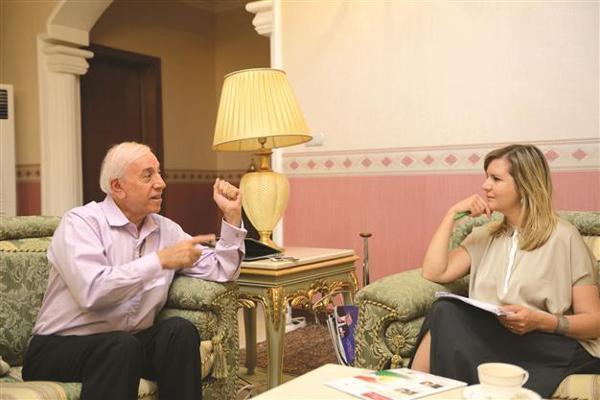Iraqi Kurds won’t declare state ‘without telling Turkey’
Cansu Çamlıbel ARBIL


Hürriyet reporter Cansu Çamlıbel (R) talks with KRG Natural Resources Minister Ashti Hawrami in Massif, a town near the northern Iraqi province of Arbil. HÜRRİYET photo, Sebati KARAKURT
Kurds will not surprise Turkey with the establishment of a possible independent state, according to Kurdistan Regional Government (KRG) Natural Resources Minister Ashti Hawrami.“Our relationship is strategic, not opportunistic. Therefore, with any steps we take, whether confederation or some form of independence or something else … I don’t think our leadership will do anything without Ankara being fully aware. There shall not be any surprises for anybody. There will be very continuous, fraternal consultation,” Hawrami said.
“We are mindful of doing things properly. We have to consider if any decision we take might affect somebody else, so there will be at every step full consultation. I don’t think there will be any surprises either way,” he said.
Hawrami’s statement came as Iraqi Kurds have seized on recent chaos in Iraq to expand their autonomous northern territory to include Kirkuk. KRG President Masoud Barzani visited Kirkuk last week and said there was no going back on autonomous Kurdish rule in the oil city.
“Looking at the map, you have to think ‘where is our future?’ Is our future with the Islamic State of Iraq and the Levant (ISIL) or with Baghdad, who doesn’t even send our budget. Today Iraq needs Kurdistan more than ever,” Hawrami said.
Hawrami visited Ankara on June 26, accompanying KRG Prime Minister Nechirvan Barzani. Asked what topics they would discuss with Turkish officials apart than energy, Hawrami said: “Our energy discussions have been ongoing for a couple of years now. We update each other and our cooperation is strategic. Anything we do here, they are aware of it. Anything we do in Ceyhan, we are doing with the cooperation of the Turkish Energy Company (TEC) and Botaş. So we continued our discussions and trying to improve and increase oil exports.”
Hawrami said the export of oil was one of the KRG’s constitutional rights. “We have the right to produce, to sell and to market oil. We act accountably and responsibly to our counterparts. What we sell is transparent, what we receive is transparent. We are entitled to 17 percent of Iraq’s oil.
Currently, we are receiving nothing; we are entitled to much more. Our policy is basically to maintain our constitutional rights,” he said, while rejecting claims that the administration had sold oil to Israel. “We haven’t really sold oil to Israel directly or indirectly. I think people are trying to politicize the issue as if we are close to Israel,” he said.
Turkey has no share over oil payments
The minister also said Turkey did not have any share over oil payments. “Turkey has a transit fee and payment for services. This is the normal international procedure … I am using your territory, your pipeline and terminals, so I have to pay something for that. But do they get a cut from KRG’s oil? No, absolutely not. If they would like to buy, they can do so like everybody else at the same price. We would love to sell it to them as well,” he said.
Asked whether the Obama administration was reluctant to approve the sale of Kurdish oil, Hawrami said the United States seemed to be confusing centralized control and the unity of the country. “The way I will put it is that they wrongly equate the unity of Iraq with centralization. Therefore, big issues like oil are to be controlled by Baghdad, and they see that if it is decentralized it won’t work. What they have forgotten is that we have a Constitution which actually says this state is a federal state. So they seem to be mixing up central control and the unity of the country. Nobody wants to be ruled by one section of Iraq. Our Constitution says we have to have a fair say. Since we are not getting that, we have a right to act according to our Constitution. The U.S. is actually not anti-KRG. But they are just not helpful by saying it has to be through or with Baghdad,” he said.
U.S. Secretary of State John Kerry visited Arbil last week and urged Kurdish leaders to stand with Baghdad in the face of an insurgent onslaught that threatens to dismember the country.
New system needed
Hawrami said Iraq needed a new governing system. “I think whatever happens, it is clear that Iraq has to be governed differently than the last three-four years. It needs to settle into some kind of confederation or federal system. Whatever we had before was not functioning, and we cannot go back to that system again. I don’t see that happening,” Hawrami said.
Asked about the status of Kirkuk, Hawrami said there should be a referendum soon. “My president repeated few times that the issue of Article 140 in practice has been solved. But legally, very quickly people should be asked whether they want to be part of this region. But in practice, it is basically under the control of the peshmerga and Kurdistan,” he said, while rejecting claims that the Turkmen population would be alienated from this process. “Turkmens are our brothers and there is no difference between Turkmens and us. Kurdistan belongs to all people living here. They have to have their share, say, well-being and benefits from the budget and revenue.”
